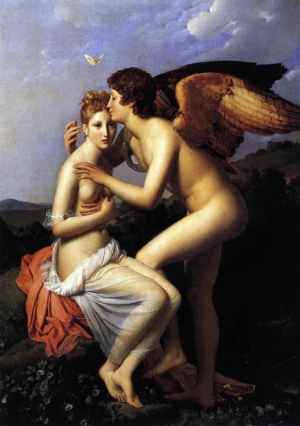
 "
"
Gérard, François (1770-1837). 1798, Oil on canvas, 186 x 132 cm.
Musée du Louvre, Paris. Web Gallery of Art
The story of Pyramis and Thisbe was retold by Shakespeare as Romeo and Juliet (and also appears as a subplot in A Midsummer Night's Dream) and, in modern times, in The Fantastiks and West Side Story. In the original tale, the two young lovers, Pyramis and Thisbe, grow up separated by a wall through which they communicate their love. Their parents, however, are enemies. Eventually, the two young lovers plan to run away, meeting under the mulberry tree. Thisbe arrives first, and terrified of an approaching lion, flees, but drops her cloak, which the lion mauls. When Pyramis arrives and sees the cloak, he is convinced Thisbe has been killed by the lion and takes his own life. When Thisbe returns and finds him, she also commits suicide, and the gods, to honor them, change the color of the mulberries to deep blood red (Hamilton 135-138).
Another story which has often been retold is the tale of Pygmalion and Galatea. Pygmalion was a sculptor, a misogynist, who fell in love with the female form he sculpts. One of my favorite comedies Mannequin plays with this tale when a young man working in a mannequin factory falls in love with the mannequin he has made, only to see her come alive at night in the store where he works. A famous story based on this old tale is George Bernard Shaw's Pygmalion, which was the basis for the musical My Fair Lady, where Professor Higgins falls in love with his creation, the unkempt street vendor Eliza Dolittle whom he has turned into a lady.
In the story of Orpheus and Eurydice love conquers death--almost. When Eurydice dies, Orpheus braves hell to bring her back to life and only loses her at the last moment when he turns to see her decaying body despite being warned not to look on her until they had escaped the underworld (Hamilton 138-142). That backward look is reminiscent of the final act of Lot's wife, who fleeing the destruction of Sodom and Gomorrah, turns for one last homeword look and is turned to salt for her disobedience (Genesis 19.17-26; Luke 17.28-32). Often lovers are united in death; the elderly couple Baucis and Philemon are changed into a linden and oak, sharing a single trunk for entertaining "angels unaware," Zeus and Hermes (Hamilton 150-153).
Not all love stories turn out well. In Virgil's Aeneid, Aeneas abandons Dido to fulfill his destiny. Theseus, promises to marry Ariadne after she helps him kill the Minotaur and free the Athenians from her father's demands for tribute. But then he leaves her on the island of Naxos, perhaps deliberately, perhaps not (Hamilton 211-16). In The Quest of the Golden Fleece, Jason promises to marry Medea if she will help him steal the golden fleece from her father. She sacrifices everything for Jason, even helping murder her own brother. In Euripides' Medea, Jason abandons Medea for a younger woman, and as "a woman scorned," she has her vengenance. She murders their children and her husband's lover (Rosenberg 204-246). In another famous love triangle from the British Isles, the love of Lancelot and Guinever leads to the downfall of King Arthur and the Round Table (Rosenberg 418-455).
Nor is wooing a woman ever easy. Melanion (Hippomenes) won Atalanta by beating her in a foot race, which he was only able to do by tossing three golden apples to the side of the path. Atalanta, enchanted by their beauty, stopped to retrieve each one, giving Melanion just enough of an edge to win the race--and her heart (Hamilton 248-51). Eve wasn't the only woman seduced by fruit. And in Mesopotamia, the romance between Inanna (Ishtar) and Dumuzi (Tammuz) parallels many modern stories with Inanna questioning whether Dumuzi is "good enough" for her, then falling passionately in love with him, only to have Damuzi lose interest in her and bury himself in his work (Leonard and McClure 137-144).
The wives of soldiers and sailors know the pain of waiting for a husband who may not return home. In Ceyx and Alcyone, Alcyone waits for a husband who is drowned at sea, and learning of his fate, throws herself into the sea, where she and her husband are miraculously transformed into sea birds (Hamilton 142-145). In a similar story, Hero and Leander, Leander swims the Hellespont each night to be with his lover until he is drowned when the lighthouse fails during a storm, and in despair, Hero kills herself (Hamilton 432).
If love between humans is difficult, being loved by a god can be much worse. There are numerous tales about the unwilling paramours of Zeus, and Hera's jealous rage against them and their offspring. The goddess of the moon Selene causes Endymion to sleep forever so she can keep him (Hamilton 154). Escaping the unwanted attentions of a god or goddess is usually problematic. To escape Apollo, Daphne is turned into a laurel tree by her river-god father (Hamilton 154-5). In an attempt to escape the attentions of the river-god Alpheus, the huntress Arethusa is turned into a spring of water by Athena, the waters of both Alpheus and Arethusa eventually mingling in a fountain (Hamilton 157-8).
